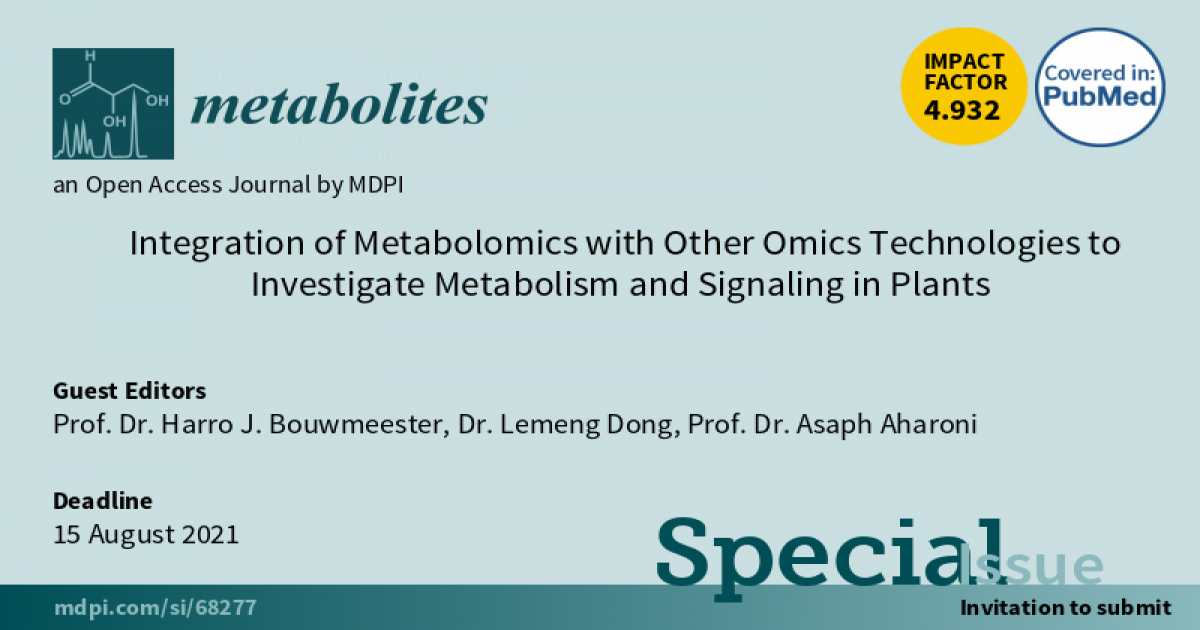Integration of Metabolomics with Other Omics Technologies to Investigate Metabolism and Signaling in Plants
A special issue of Metabolites (ISSN 2218-1989). This special issue belongs to the section "Plant Metabolism".
Deadline for manuscript submissions: closed (15 August 2021) | Viewed by 14587

Special Issue Editors
Interests: rhizosphere signalling; strigolactones; terpenoid metabolism
Interests: plant metabolism; metabolomics; plant-nematode-microbe interaction; stress biology; metabolic engineering
Special Issue Information
Dear Colleagues,
Plants constantly adapt their metabolism and signaling to survive in a highly dynamic environment. In the past few years, the integration of metabolomics and other omics technologies such as genomics, transcriptomics, proteomics, metagenomics, and metatranscriptomics has accelerated our understanding of plant metabolism and plant signaling and their role in the interaction between plants and their (a)biotic environment. This Special Issue will focus on the integration of omics technologies to elucidate metabolite biosynthesis, perception, and transport and their role in signaling within a plant and between plants and other organisms in their environment. In addition, discoveries made through the integration of omics technologies have promoted applications in the fields of biotechnology and synthetic biology. We would like to invite researchers employing metabolomics in conjunction with other (omics) tools to contribute papers on hormone metabolism and signaling in plants, systemic and local signal responses to biotic and abiotic stresses, stress-induced metabolic reprogramming, chemical communication between plants and other organisms, molecular farming, food quality improvement, and agricultural and pharmaceutical applications.
Prof. Dr. Harro J. Bouwmeester
Dr. Lemeng Dong
Prof. Dr. Asaph Aharoni
Guest Editors
Manuscript Submission Information
Manuscripts should be submitted online at www.mdpi.com by registering and logging in to this website. Once you are registered, click here to go to the submission form. Manuscripts can be submitted until the deadline. All submissions that pass pre-check are peer-reviewed. Accepted papers will be published continuously in the journal (as soon as accepted) and will be listed together on the special issue website. Research articles, review articles as well as short communications are invited. For planned papers, a title and short abstract (about 250 words) can be sent to the Editorial Office for assessment.
Submitted manuscripts should not have been published previously, nor be under consideration for publication elsewhere (except conference proceedings papers). All manuscripts are thoroughly refereed through a single-blind peer-review process. A guide for authors and other relevant information for submission of manuscripts is available on the Instructions for Authors page. Metabolites is an international peer-reviewed open access monthly journal published by MDPI.
Please visit the Instructions for Authors page before submitting a manuscript. The Article Processing Charge (APC) for publication in this open access journal is 2700 CHF (Swiss Francs). Submitted papers should be well formatted and use good English. Authors may use MDPI's English editing service prior to publication or during author revisions.
Keywords
- Plant metabolism
- Signaling
- Metabolomics
- Genomics, transcriptomics
- Abiotic and biotic stress
- Synthetic biology
- Proteomics
Benefits of Publishing in a Special Issue
- Ease of navigation: Grouping papers by topic helps scholars navigate broad scope journals more efficiently.
- Greater discoverability: Special Issues support the reach and impact of scientific research. Articles in Special Issues are more discoverable and cited more frequently.
- Expansion of research network: Special Issues facilitate connections among authors, fostering scientific collaborations.
- External promotion: Articles in Special Issues are often promoted through the journal's social media, increasing their visibility.
- Reprint: MDPI Books provides the opportunity to republish successful Special Issues in book format, both online and in print.
Further information on MDPI's Special Issue policies can be found here.






